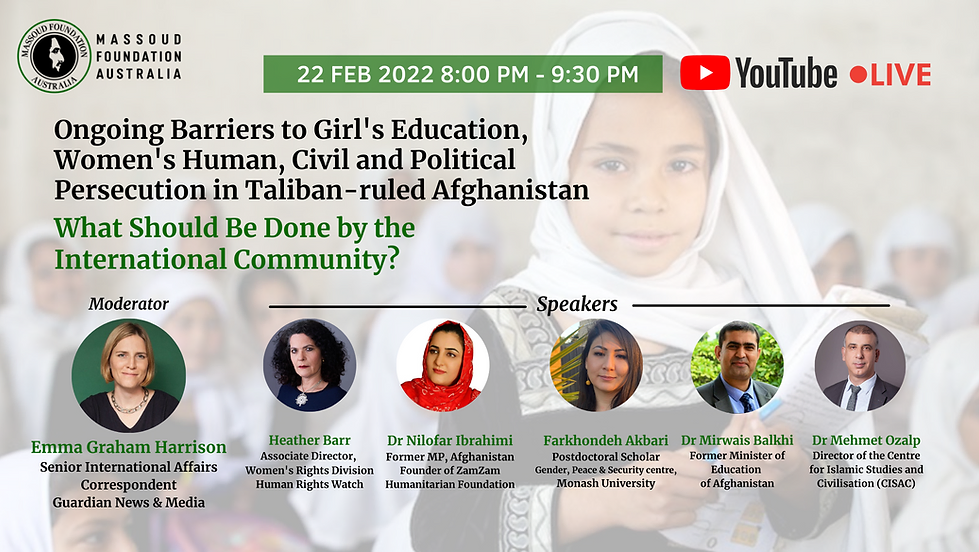
Ongoing Barriers to Girl’s Education, Women’s Human, Civil and Political Persecution in Taliban-ruled Afghanistan
On 15th August 2021, the Taliban seized control of Kabul. Almost immediately, they banned Secondary and Tertiary education for girls. Education is a fundamental human right for all. The Taliban have systematically imposed gender-based discrimination and restrictive measures that target women and girls, which almost erase them from public life.
Women cannot work, study, protest and they are increasingly forced to be confined to their homes.
Nevertheless, across Afghanistan, courageous women continue to protest and fight to reinstate their rights to education, work, and freedom. To counter this the Taliban have started a series of brutal measures. They have recently abducted women activists and protesters across Afghanistan and taken them to unknown locations.
There are horrible stories of rape on such women in Mazar-e Sharif, for example. This needs to be urgently investigated by human rights organisations. In short, after the fall of Afghanistan into the Taliban’s hands, Afghans feel that the hope of a normal life for women and girls in Afghanistan is fast evaporating. In her statement at an international meeting with the Taliban in Oslo, the women’s civil and political rights movement. The women’s rights activist Ms. Hoda Khamosh, used the term “gender apartheid” to describe the situation. This is blatant discrimination and simply has to stop.
In the face of all the atrocities committed by the Taliban regime, the world is numb, and there is an urgent need of raising public awareness of the situation in Afghanistan. Holding a webinar panel to discuss these urgent issues will help increase awareness of the tragic situation created by the Taliban in Afghanistan. The international community must be informed if we want the blatant breaches of human rights to stop here Another objective is also to raise funds for the Massoud Foundation Australia girl’s education project in Afghanistan.
The Massoud Foundation Australia, in parallel with other organisation, is sponsoring women teachers to carry on teaching secondary school subjects through private institutions across Afghanistan so that girls can go ahead with their education. Due to security concerns, we are not able to provide details about our work in Afghanistan.
Date & Time:Tuesday, 22/02/2022 – 8:00 – 9:30 PM (Australian Eastern Daylight Time), (1:35 PM, Kabul Time).
Moderator:
- Emma Graham-Harrison – Senior international affairs correspondent at The Guardian. Emma was previously Afghanistan bureau chief for Reuters news agency. She graduated from the University of Oxford with a Bachelor’s degree in Chinese studies. She began her career translating newspapers in Beijing, Graham-Harrison charted the country’s rise through the development of energy and its growing environmental problems, reporting from around the Country. During four years in Afghanistan, she reported from Taliban-controlled districts and embedded with Nato soldiers.
Speakers:
- Heather Barr, is associate director of the Women’s Rights Division at Human Rights Watch. She has researched human rights in countries including Afghanistan, Bangladesh, Myanmar, Nepal, Pakistan, Papua New Guinea, South Korea and the US on issues including child marriage, girls’ education, women’s access to health care, domestic violence, online gender-based violence, so called “moral crimes”, “honor violence” and “virginity exams”, the rights of refugees and prisoners, torture, civilian casualties, freedom of expression and association, and human trafficking. She was the interim/acting co-director of the Women’s Rights Division from 2018-2021. She joined Human Rights Watch in 2011 in Kabul, Afghanistan, as the Afghanistan researcher, after working for the United Nations on human rights and legal reform in Afghanistan, Bangladesh, Burundi and Jordan. After law school, she litigated a class action lawsuit on behalf of imprisoned people with psychosocial disabilities in New York City and founded an alternative-to-incarceration program for people with psychosocial disabilities who had committed felonies. Before law school, she worked in a New York City shelter for homeless women. She is a graduate of London School of Economic, Columbia University School of Law, John Jay College of Criminal Justice and Seattle Central Community College.
- Dr Mirwais Balkhi, Former Minister of Education – Afghanistan – He joined the Ministry of Education of the Islamic Republic of Afghanistan in 2018 as the acting Minister of Education. Mirwais Balkhi holds a Ph.D. in International Relations (with specialisation in West Asian Studies) from Jawaharlal Nehru University in New Delhi India. He has published numerous academic articles both in English and Persian; including the books ‘Saudi Arab’s Foreign Policy towards Afghanistan; 1991-2014’ and ‘A Critique on Afghanistan’s Regional Integration’. Dr Balkhi has also edited the book ‘Afghanistan After 2014’. Dr Balkhi has worked as the Deputy Ambassador of the Islamic Republic of Afghanistan in New Delhi and previously as the head of Africa and Middle East Desk in the Center for Strategic Studies (CSS) and as the Chief Editor of the CSS’ Quarterly Journal of Strategic Studies. Prior to joining the CSS, Dr Balkhi was a lecturer at the Law and Political Science Faculty.
- Dr Nilofar Ebrahimi, Former MP – Afghanistan, Founder of ZamZam Foundation – She was a member of the Afghanistan Parliament from 2010 – 2020, in the women’s and human rights commission and the International Relation Commission. She represented the northeast province of Afghanistan (Badakhshan). Dr Ebrahimi is also the founder of ZamZam Humanitarian Foundation. In addition to that, Dr Ebrahimi serves as a volunteer member of the Afghan Women’s Network. Drs. Nilofar Ebrahimi attended several conferences concerning Afghanistan on women’s rights, anti-corruption conferences, security talks in the United Kingdom, Bangladesh, Pakistan, France, Italy, Turkey, Swiss, and Norway. Dr. Ebrahimi is married, has 5 children, and currently lives in Canberra, Australia.
- Dr Mehmet Ozalp – Director of the Centre for Islamic Studies and Civilisation (CISAC). He is one of the most prominent Muslim community leaders in Australia and an Associate Professor of Islamic studies and the Director of the Centre for Islamic Studies and Civilisation (CISAC). He is the founder and Executive Director of Islamic Sciences and Research Academy (ISRA). Mehmet is the editor-in-chief of the Australian Journal of Islamic Studies. He is a scholar, public intellectual, community leader with three decades of community service. He is the author of 47 publications including three books.
- Farkhondeh Akbari, Postdoctoral Scholar – Gender, Peace & Security centre, Monash University – Farkhondeh Akbari is a postdoctoral research fellow at the Gender, Peace and Security centre, Monash University. Her research focuses on diplomacy, peace settlements with non-state armed actors and studied the Taliban in Afghanistan and the Khmer Rouge in Cambodia. Farkhondeh has completed her Ph.D. at the Australian National University. She obtained a bachelor’s and master’s in International Relations and an advanced master’s in Diplomacy. Farkhondeh has work experience with the United Nations Headquarters in New York, the Afghanistan Independent Human Rights Commission, and Afghanistan’s Independent Directorate of Local Governance in Kabul. Farkhondeh is using her research to advocate for human rights in Afghanistan.
Vote of Thanks:
- Silvia Greco, Convener – Amnesty International

